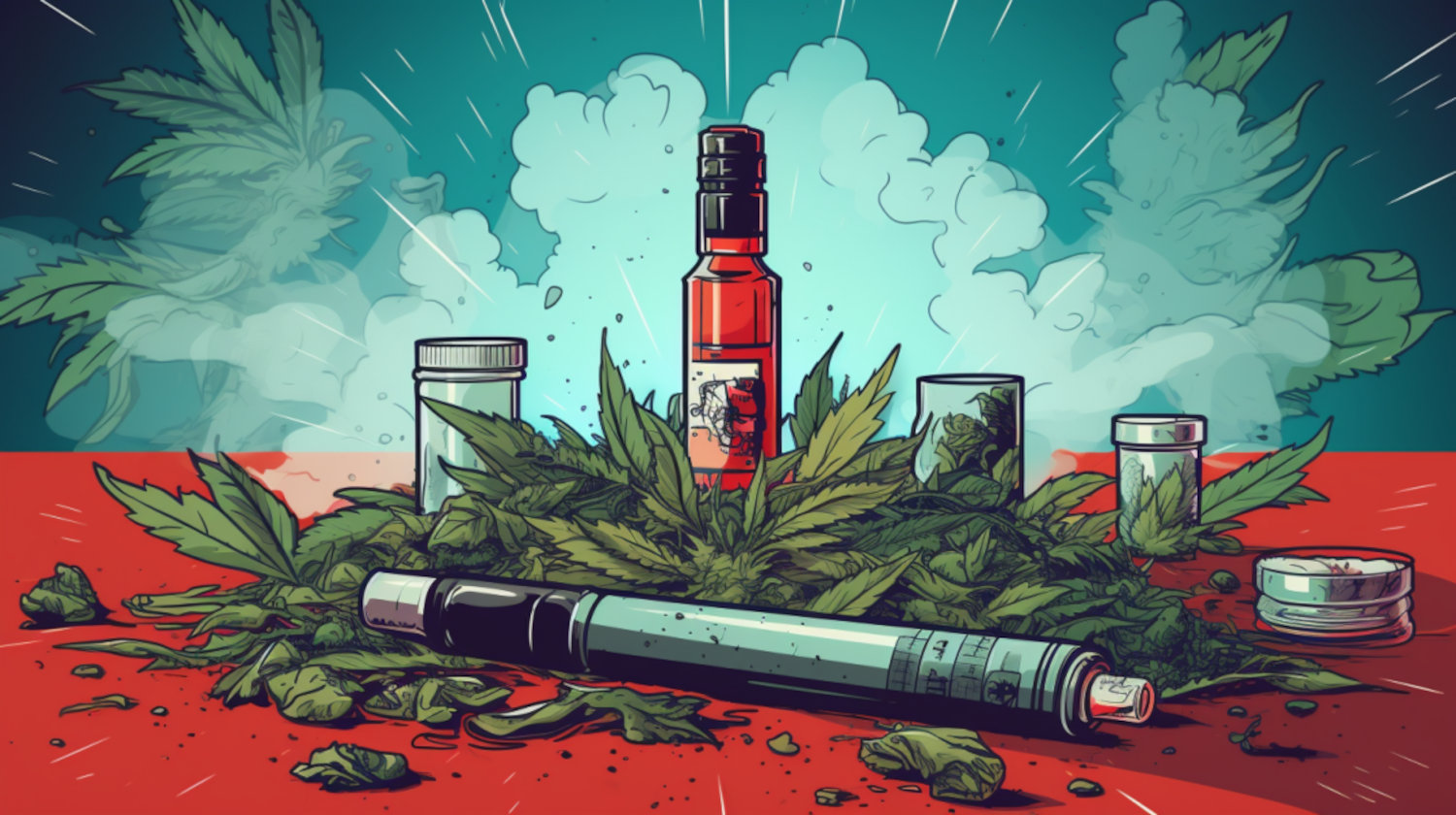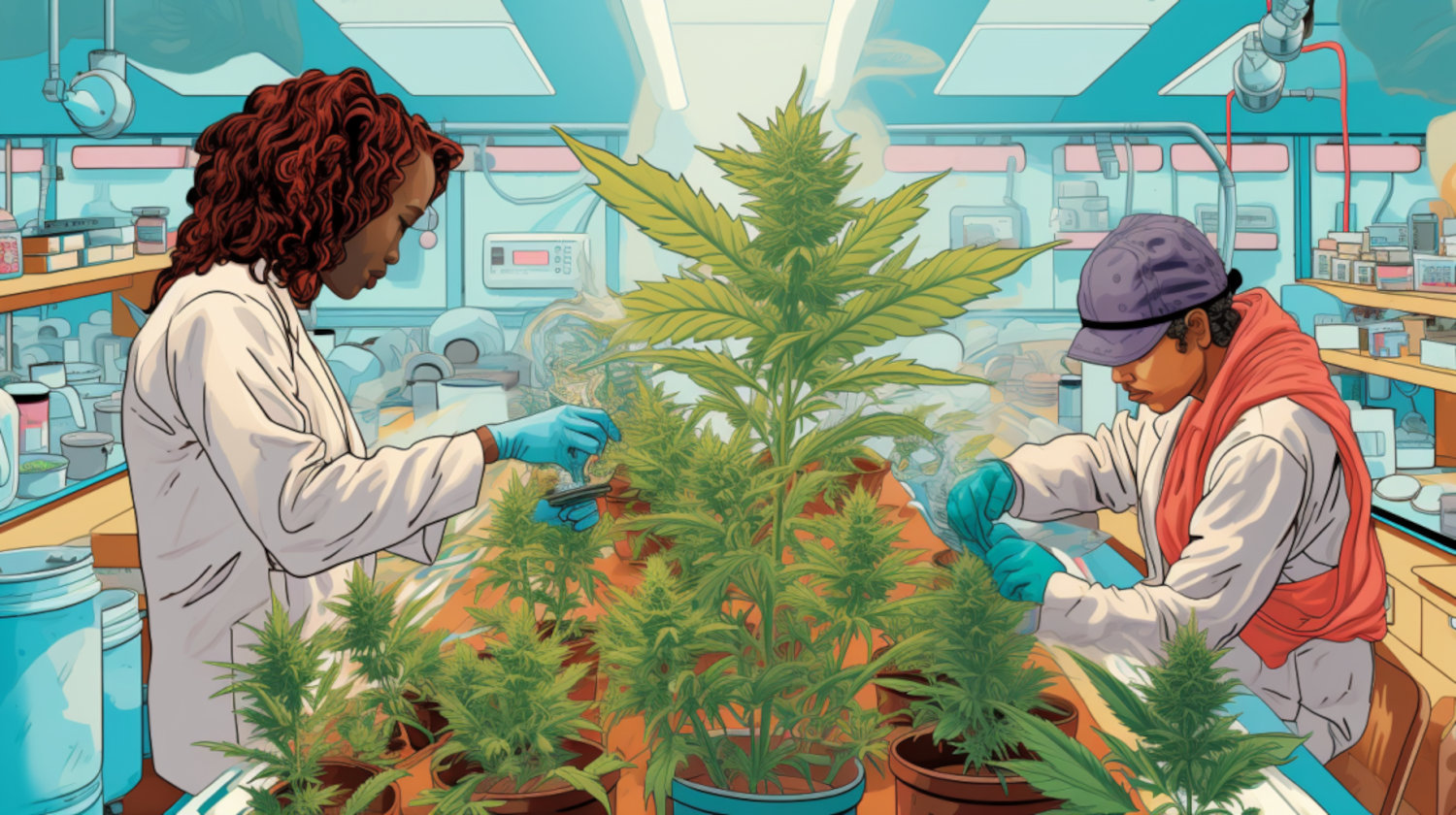The landscape of cannabis-derived cannabinoids has significantly diversified since the 2018 Farm Bill, introducing a variety of compounds like THC-M. This lesser-known cannabinoid, emerging in the shadow of its more famous counterparts, such as THC, offers unique properties and effects.
THC-M is not a primary product of the cannabis plant but rather a byproduct, often found in small quantities. Its scarcity has posed challenges for research and study, but its effects and potential applications may draw interest from some within the cannabis community.1
What Is THC-M?
THC-M, also called THCM or THC M, is a rare and little-known cannabinoid. It’s related to compounds called monomethyl ethers. These compounds are different versions of natural cannabinoids like CBDA (cannabidiolic acid) and THCA (tetrahydrocannabinolic acid). These altered forms are known as CBDMA and THCMA.
When these compounds are heated (decarboxylation), the cannabinoids activate. From THCMA (or CBDMA), they change into THC-M (or CBD-M, respectively).
History of THC-M
The exploration of THC-M dates back to as early as 1973, with its first detection in cannabis smoke. However, chromatographic challenges initially hindered the isolation of THC-M.
Characteristics and Production
Unlike primary cannabinoids like THC (tetrahydrocannabinol) and CBD (cannabidiol), THC-M is not directly produced by the cannabis plant. Instead, it’s a byproduct, typically found in much smaller quantities. This scarcity has posed significant challenges in its study and isolation, making it a subject of considerable scientific interest.
Mass-produced THC-M is often semi-synthetic, typically derived through a process involving the conversion of CBD to delta-9 THC and then to THC-M. Additionally, THC-M serves as an analytical reference standard in cannabinoid analytics, highlighting its importance in scientific studies and analytical testing.
Effects of THC-M

THC-M's interaction with the human ECS is a key area of ongoing research. The ECS plays a vital role in regulating various physiological and cognitive processes, including pain sensation, mood, appetite, memory, and sleep. However, the specific ways in which THC-M interacts with this system are not yet fully understood.
In terms of potency, preliminary findings suggest that THC-M may be less potent than delta-9 THC. This reduced potency is thought to be due to the absence of a double bond in THC-M’s molecular structure.
Given the early stage of research on THC-M, it is important to approach claims about its intoxicating properties or physiological effects with caution. Currently, the scientific community lacks comprehensive studies that can conclusively determine THC-M's unique impact compared to more well-studied cannabinoids like THC and CBD.
As such, while THC-M is a compelling area for future research, any discussion of its effects and benefits is merely speculative. Further studies are essential to uncover the full scope of THC-M's properties and potential therapeutic applications.
Risks of THC-M
The primary challenge in assessing the risks associated with THC-M is the scarcity of comprehensive research. Unlike more extensively studied cannabinoids such as THC and CBD, the long-term effects of THC-M on both physical and mental health are not well-documented. This lack of data underscores the need for caution among users and researchers alike.
Like other cannabinoids, THC-M may interact with various medications or exacerbate certain health conditions. Without detailed studies, the extent and nature of these interactions remain speculative. Individuals with pre-existing health conditions or those taking medication should consult healthcare professionals before using products containing THC-M.
As with other unregulated cannabinoid products such as delta-8 THC, the synthesis process of THC-M may result in the formation of harmful by-products.
Additionally, there is a risk that THC-M extracts could be adulterated with other fillers and additives, which may pose health risks. Be wary of the source and quality of THC-M products or products that contain THC-M.
The legal status of THC-M varies by jurisdiction, and it may fall under different regulatory frameworks than more common cannabinoids. Stay informed about the legal implications of possessing or using THC-M.
While THC-M presents an intriguing area for research and potential applications, the current understanding of its risks is limited. Exercise caution, speak with your doctor, prioritize safety, and consider the existing legal and regulatory frameworks.
THC-M vs. Other Popular Cannabinoids

Comparing THC-M with other established cannabinoids can help us better understand its unique characteristics. This approach clarifies what sets THC-M apart and provides a practical perspective.
THC-M vs. Delta-9 THC
Delta-9 THC is famous for its intoxicating effects, whereas THC-M, while structurally similar, is suspected to be less potent. This difference in potency likely results from THC-M's molecular structure; notably, the absence of a double bond in delta-9 THC. The exact intoxicating properties and potential therapeutic applications of THC-M are not yet fully understood.
THC-M vs. Delta-8 THC
Delta-8 THC is a less potent analog of delta-9 THC, known for its milder intoxicating effects. THC-M, in comparison, may have even less potency. Both cannabinoids are less commonly found in cannabis plants, often requiring synthetic production methods.
THC-M vs. Delta-10 THC
Delta-10 THC is another analog of THC with a distinct molecular structure. Like THC-M, delta-10 THC is less common in cannabis plants and is not as extensively researched as delta-9 THC. Comparing the two, THC-M's effects, potency, and therapeutic potential are not well understood.
THC-M vs THCA
THCA is the non-intoxicating precursor to THC present in raw cannabis plants. Upon decarboxylation, THCA converts into delta-9 THC. THC-M, on the other hand, is a derivative of THC and is formed through different processes within the plant. The specific properties of THC-M, especially in comparison to the well-documented effects of THCA and THC, remain to be fully explored.
THC-M vs. THCV
THCV is a homolog of THC, known for its unique effects, which can differ significantly from those of THC, such as a reduced intoxicating impact and potential appetite suppression.2 THCV can be extracted from certain high-THCV cannabis strains or produced semi-synthetically from CBD, similar to the production methods for THC-M.
THC-M Products
Currently, the market for THC-M products is relatively limited. Most available products fall into categories like disposable vapes and weed cartridges, primarily online. However, potential consumers should exercise due diligence in verifying the legitimacy and safety of these products.
The legal status of THC-M is not straightforward. While hemp derivatives are legalized under the 2018 Farm Bill, this mainly pertains to non-intoxicating cannabinoids like CBD. Intoxicating derivatives like THC-M exist in a legal gray area. Like CBD, these products are not subject to any regulations or standards for production or testing, so it is best to avoid products sold outside a licensed dispensary.
The legality of THC-M products can vary significantly by state. Some states may have specific regulations or prohibitions regarding THC-M and similar compounds.
References
- Linciano P, Citti C, Russo F, et al. Identification of a new cannabidiol n-hexyl homolog in a medicinal cannabis variety with an antinociceptive activity in mice: cannabidihexol. Scientific Reports. 2020;10(1). doi:https://doi.org/10.1038/s41598-020-79042-2 ↩︎
- Abioye A, Ayodele O, Marinkovic A, Patidar R, Akinwekomi A, Sanyaolu A. Δ9-Tetrahydrocannabivarin (THCV): a commentary on potential therapeutic benefit for the management of obesity and diabetes. Journal of Cannabis Research. 2020;2(1). doi:https://doi.org/10.1186/s42238-020-0016-7 ↩︎
The information in this article and any included images or charts are for educational purposes only. This information is neither a substitute for, nor does it replace, professional legal advice or medical advice, diagnosis, or treatment. If you have any concerns or questions about laws, regulations, or your health, you should always consult with an attorney, physician or other licensed professional.




